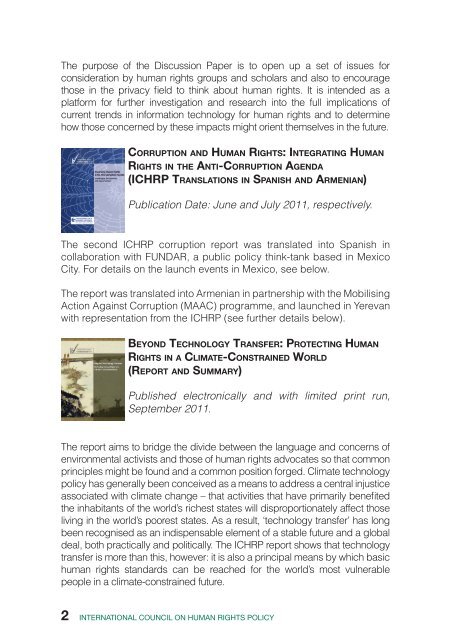Activity Report 2011–2012 - The ICHRP
Activity Report 2011–2012 - The ICHRP
Activity Report 2011–2012 - The ICHRP
Create successful ePaper yourself
Turn your PDF publications into a flip-book with our unique Google optimized e-Paper software.
<strong>The</strong> purpose of the Discussion Paper is to open up a set of issues for<br />
consideration by human rights groups and scholars and also to encourage<br />
those in the privacy field to think about human rights. It is intended as a<br />
platform for further investigation and research into the full implications of<br />
current trends in information technology for human rights and to determine<br />
how those concerned by these impacts might orient themselves in the future.<br />
Corruption and Human Rights: Integrating Human<br />
Rights in the Anti-Corruption Agenda<br />
(<strong>ICHRP</strong> Translations in Spanish and Armenian)<br />
Publication Date: June and July 2011, respectively.<br />
<strong>The</strong> second <strong>ICHRP</strong> corruption report was translated into Spanish in<br />
collaboration with FUNDAR, a public policy think-tank based in Mexico<br />
City. For details on the launch events in Mexico, see below.<br />
<strong>The</strong> report was translated into Armenian in partnership with the Mobilising<br />
Action Against Corruption (MAAC) programme, and launched in Yerevan<br />
with representation from the <strong>ICHRP</strong> (see further details below).<br />
Beyond Technology Transfer: Protecting Human<br />
Rights in a Climate-Constrained World<br />
(<strong>Report</strong> and Summary)<br />
Published electronically and with limited print run,<br />
September 2011.<br />
<strong>The</strong> report aims to bridge the divide between the language and concerns of<br />
environmental activists and those of human rights advocates so that common<br />
principles might be found and a common position forged. Climate technology<br />
policy has generally been conceived as a means to address a central injustice<br />
associated with climate change – that activities that have primarily benefited<br />
the inhabitants of the world’s richest states will disproportionately affect those<br />
living in the world’s poorest states. As a result, ‘technology transfer’ has long<br />
been recognised as an indispensable element of a stable future and a global<br />
deal, both practically and politically. <strong>The</strong> <strong>ICHRP</strong> report shows that technology<br />
transfer is more than this, however: it is also a principal means by which basic<br />
human rights standards can be reached for the world’s most vulnerable<br />
people in a climate-constrained future.<br />
2 INTERNATIONAL COUNCIL ON HUMAN RIGHTS POLICY
















